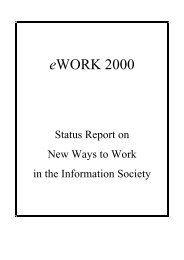Proceedings of 8th European Assembly on telework (Telework2001)
Proceedings of 8th European Assembly on telework (Telework2001)
Proceedings of 8th European Assembly on telework (Telework2001)
You also want an ePaper? Increase the reach of your titles
YUMPU automatically turns print PDFs into web optimized ePapers that Google loves.
190the development coaliti<strong>on</strong>s being formed in a substantial number <str<strong>on</strong>g>of</str<strong>on</strong>g> <str<strong>on</strong>g>European</str<strong>on</strong>g> regi<strong>on</strong>s (Ennals &Gustavsen 1998).A questi<strong>on</strong> invariably emerging when this kind <str<strong>on</strong>g>of</str<strong>on</strong>g> research role is indicated is why do we needresearch at all: if it is so that everything is subject to local settlement, why not depend purely <strong>on</strong>the practical skills and insights <str<strong>on</strong>g>of</str<strong>on</strong>g> the other actors? Even when they rely str<strong>on</strong>gly <strong>on</strong> insights andexperiences emerging from practices, the other actors tend, however, to develop complementaryroles. Not everybody in an innovati<strong>on</strong> system is an engineer; there will be ec<strong>on</strong>omists, designers,marketing experts, venture capitalists and much more, all working interactively. Even whenpractical experience and the locally unique are the driving forces more general c<strong>on</strong>cepts andknowledge are always in active use to highlight experience, locate it within a framework and giveit forms and shapes that can make it fit the larger whole identified as the innovati<strong>on</strong> process <str<strong>on</strong>g>of</str<strong>on</strong>g>the whole network. The purpose <str<strong>on</strong>g>of</str<strong>on</strong>g> having research <strong>on</strong> organisati<strong>on</strong> within this kind <str<strong>on</strong>g>of</str<strong>on</strong>g> c<strong>on</strong>textis simply to have the same resources in terms <str<strong>on</strong>g>of</str<strong>on</strong>g> knowledge present here as is generally the casewithin the other subject areas. Out <str<strong>on</strong>g>of</str<strong>on</strong>g> local experiences more generalised knowledge will <str<strong>on</strong>g>of</str<strong>on</strong>g> coursealways emerge: the point is that each local situati<strong>on</strong> is the primary c<strong>on</strong>text and no knowledge canclaim generality unless it proves its worth within each <str<strong>on</strong>g>of</str<strong>on</strong>g> the c<strong>on</strong>texts <strong>on</strong> which it is brought tobear.With the emergence <str<strong>on</strong>g>of</str<strong>on</strong>g> c<strong>on</strong>tinuously more multiplex and dense relati<strong>on</strong>ships between organisati<strong>on</strong>s,the issue <str<strong>on</strong>g>of</str<strong>on</strong>g> organisati<strong>on</strong> itself acquires further dimensi<strong>on</strong>s. How to organise becomes an evenmore critical issue. That Europe in general still falls short <str<strong>on</strong>g>of</str<strong>on</strong>g> its potential for innovati<strong>on</strong> anddevelopment, due to a reluctance to set issues <str<strong>on</strong>g>of</str<strong>on</strong>g> organisati<strong>on</strong> <strong>on</strong> the agenda, can hardly be madesubject to much dispute. Admittedly, North America and in all probability even Japan c<strong>on</strong>stitutewhat many may see as less difficult challenges than Europe. Europe is str<strong>on</strong>ger in terms <str<strong>on</strong>g>of</str<strong>on</strong>g>formalised rights and duties, degree <str<strong>on</strong>g>of</str<strong>on</strong>g> organisati<strong>on</strong> according to interests, formalised negotiati<strong>on</strong>sand corresp<strong>on</strong>ding instituti<strong>on</strong>s and even in interdependencies between politics and workplacedevelopment. Issues <str<strong>on</strong>g>of</str<strong>on</strong>g> organisati<strong>on</strong> are still <str<strong>on</strong>g>of</str<strong>on</strong>g>ten experienced as difficult to place <strong>on</strong> the agendaand Europe quite clearly lacks the kind <str<strong>on</strong>g>of</str<strong>on</strong>g> “learning event terminology” that evolved in Japaneseenterprises in the high time <str<strong>on</strong>g>of</str<strong>on</strong>g> such noti<strong>on</strong>s as total quality, zero stock logistics and lean producti<strong>on</strong>(Womack et al 1990; Helling 1991.) Whereas the United States as well as Japan must probably becharacterised as having been more successful than Europe in developing technology, it is a strangeparadox that in Europe there is much more talk about technology and corresp<strong>on</strong>dingly less aboutorganisati<strong>on</strong>. When an actor within the <str<strong>on</strong>g>European</str<strong>on</strong>g> Uni<strong>on</strong> – the former head <str<strong>on</strong>g>of</str<strong>on</strong>g> DG V Allan Larss<strong>on</strong>- some years ago developed a green paper <strong>on</strong> work organisati<strong>on</strong> a door was opened towards a<str<strong>on</strong>g>European</str<strong>on</strong>g> discourse <strong>on</strong> organisati<strong>on</strong> (<str<strong>on</strong>g>European</str<strong>on</strong>g> Commissi<strong>on</strong> 1997). The door was rapidly closedagain and at the moment the agencies <str<strong>on</strong>g>of</str<strong>on</strong>g> the <str<strong>on</strong>g>European</str<strong>on</strong>g> Uni<strong>on</strong> c<strong>on</strong>tribute little in this field (whereaspapers <strong>on</strong> technology (and ec<strong>on</strong>omy) reach c<strong>on</strong>tinuously new heights). Initiatives are again leftwith nati<strong>on</strong>s, regi<strong>on</strong>s and even smaller networks. Within this kind <str<strong>on</strong>g>of</str<strong>on</strong>g> c<strong>on</strong>text the modest programefforts we can point at in countries like Finland, Norway, Sweden, Germany may not be the mostappropriate answer – they are certainly not the full answer – but they represent efforts to come togrips with the core challenges by placing issues <str<strong>on</strong>g>of</str<strong>on</strong>g> organisati<strong>on</strong> <strong>on</strong> the agenda. The issues are madesubject to discourse and within networks encompassing a number <str<strong>on</strong>g>of</str<strong>on</strong>g> actors. Even as organisati<strong>on</strong>is c<strong>on</strong>cerned, we ensure advances by talking about things rather than by keeping silent aboutthem; by doing something rather than avoid doing something. We do not promote new forms <str<strong>on</strong>g>of</str<strong>on</strong>g>organisati<strong>on</strong> by talking about technological imperatives – what we need to do is to explicitly facethe challenges <str<strong>on</strong>g>of</str<strong>on</strong>g> organisati<strong>on</strong> as such.








